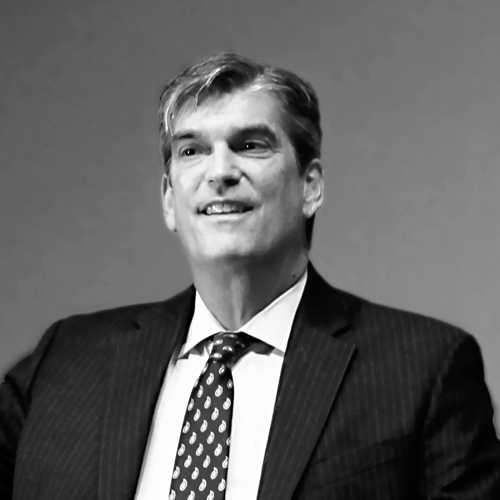Disagreements at the corporate level often arise not over differences in opinion, but differences in word use, explains Kevin McDonald, senior vice president, chief compliance officer, general counsel, and secretary at VW Credit.
Take for instance the word “loan.” Often, people may refer to car loans when they are, in fact, talking about installment contracts. “You may have a loan from your bank, but then again, you may have a credit contract with a finance company that you’ve worked with. Well, those are two different products, and oftentimes, they’re referred to as the same,” McDonald explains.
This “sloppy diction,” as McDonald refers to it, is not only confusing, but also has legal implications. “It may seem like a pedantic point, but actually, it’s a big deal to refer to the type of product you have accurately because there’s a whole set of laws that apply to one product versus another product,” McDonald says.
In order to help address this problem, McDonald is coediting a dictionary of auto finance terms set to be published by the American Bar Association (ABA) both in hard copy and digital formats. McDonald arrived at the idea after seeing an electronic dictionary published through the ABA titled Frequently Used Terms in Securitization and Structured Finance Transactions: Jargon, Lingo, and Lore. He was struck by the concept, its ease of use, and thought, “Why reinvent the wheel? Let’s use this concept for auto finance.”
McDonald approached the ABA with fellow lawyer John Ropiequet of Arnstein & Lehr. The ABA agreed to publish the resource, and McDonald and Ropiequet set out to find key lawyers in the field of auto finance to contribute terms and definitions.
In addition to himself and his coeditor, McDonald estimates that between fifteen and twenty people across the industry participated in helping to create the manuscript.
OFF-THE-CUFF
What’s your favorite word in German?
It has to be Fahrvergnügen. There was a famous advertising campaign where Volkswagen was advertising the fun of its cars. It was called Fahrvergnügen, which means “driving pleasure.”
What is the best advice you’ve received?
I like the advice, “Become who you are.” That was advice given by the great German philosopher Friedrich Nietzsche.
What do you enjoy doing outside of work?
I’m a big St. Louis Cardinals baseball fan. I always enjoy when spring training begins. I hope spring is eternal for baseball fans.
What’s one of your favorite books?
I would say my favorite that I’ve read recently (for a second time) is a book by Mortimer Adler called How to Speak, How to Listen. It should be mandatory reading in colleges, graduate schools, and business.
What’s something that few people know about you?
That I actually enjoy salsa dancing. I’m not good at it, but I do enjoy it.
Defining the terms
The 260 words included in the dictionary are largely derived from the contributors’ professional experience. They are “terms that, over the course of many years of collective experience, practitioners in the field identified as either frequently used, frequently used incorrectly, or frequently confused,” McDonald explains.
For example, he points to his favorite terminological mix-up—subvent versus subvene. To subvent means “to buy down an otherwise applicable interest rate,” McDonald says. But industry professionals often use the word subvene—an archaic, intransitive verb meaning “to aid”—in its place. While the words sound similar, their meanings and functions differ. Not only is subvene the incorrect word, but it’s also grammatically illogical in its usage.
McDonald hopes that the dictionary will clear up these misunderstandings—both through its comprehensive collection of terms and its ease of use. The dictionary’s e-book version can be accessed at all times, both on computers and smartphones, and can be quickly searched.
“You whip it out and say, ‘Look, this is what we’re dealing with. Do we agree about that? Yes, we agree that’s what we’re talking about,’” McDonald says.
Assuring that all parties agree on the terminology will hopefully clear the way for discussion based on the substance of an argument rather than based on the terms in use.
“I hope that this will accompany people when they enter into discussions where key terms are at play,” McDonald continues. “[It should] help facilitate a better understanding of what may be an issue and help crystallize differences where there are differences or help foster understanding where we can have understanding. And if it’s either a misunderstanding or an understanding, it’s not on the basis of confusion over key terms.”
Creating a cohesive voice
After collecting contributions from lawyers in the field, McDonald and Ropiequet edited the definitions to create a cohesive product. “When you go out to a group of people and solicit definitions, obviously, everyone will have their own way of expressing themselves,” McDonald explains. “We wanted to take that and harmonize the collected voices in a way that was consistent throughout the manuscript.”
While compiling and editing the various definitions, McDonald again focused on convenience. The definitions are written in a simple, concise language, with the goal of making an accurate, succinct resource that anyone can use. “We wanted to make the terms as accessible as possible,” McDonald says. “You don’t need a law degree to understand what we’re talking about.”
This is important because the dictionary is intended to be a resource for journalists and others outside the industry, as well as attorneys, regulators, and executives.
“Law is full of legalese, so we’re trying to, in our own way, contribute to a cleansing of legalese where possible,” he says.
This will be the first dictionary of its kind written specifically for the auto finance industry. While various glossaries of auto finance terms exist, they’re limited and are not always up to date, McDonald says.
“What you don’t have is an exhaustive, comprehensive, one-stop shop for all the key terms that affect this major field,” he says. McDonald hopes this dictionary will solve the problem. And he hopes it will inspire similar projects. “I think it’s a great resource to have,” he says.
“When you slow down and your sole project is to simply define words, you really get a greater appreciation for denotation, connotation, and word usage.”
McDonald and Ropiequet are currently completing final edits. As of press time, the dictionary, Frequently Used Terms in Automobile Finance Transactions—the Jargon, Lingo, and Lore, was slated for release in spring 2017.
Focusing on word choice
This is McDonald’s first lexicographical project, but it isn’t his first experience with linguistics. He majored in German as an undergraduate, and then he earned a legal doctorate at the University of the Saarland in Germany after first completing law school at Washington University in St. Louis. While his language background didn’t directly impact his role on this project, McDonald says he had a “natural affinity” for taking on such a task.
“You know, when you go into a foreign language, it’s an alien world, and you’re really forced to focus on words,” McDonald says. “Otherwise you can’t express yourself. What you do in your native tongue comes almost as second nature to you, but when you’re in a foreign language you really have to focus on words, word choice, and terms of expression.”
The dictionary is written in McDonald’s native tongue, but the project forced him to focus closely on word choice and meaning in a similar way to his experience with learning a foreign language. “When you slow down and your sole project is to simply define words, you really get a greater appreciation for denotation, connotation, and word usage,” he says.
_____
Barack Ferrazzano Kirschbaum & Nagelberg LLP:
“As outside counsel, we’ve had the pleasure of working with Kevin for more than fifteen years and, during that time, he has consistently displayed the experience and knowledge that distinguish him as an exceptional industry leader.”
—Randall L. Oyler, Co-Chair, Motor Vehicle Group
_____
Kutak Rock LLP:
“Kevin is a bright, articulate, and focused general counsel that will ask the hard questions for the right reasons. He takes care of his people and challenges both his staff and outside counsel to bring their ‘A’ game to the table.”
—Jay Selanders, Managing Partner
_____
Mayer Brown:
“Kevin is a dedicated leader in the auto finance industry. He has done a splendid job helping VW Credit master today’s very complicated consumer regulatory environment.”
—Stuart Litwin, Partner and Structured Finance Practice Co-head


